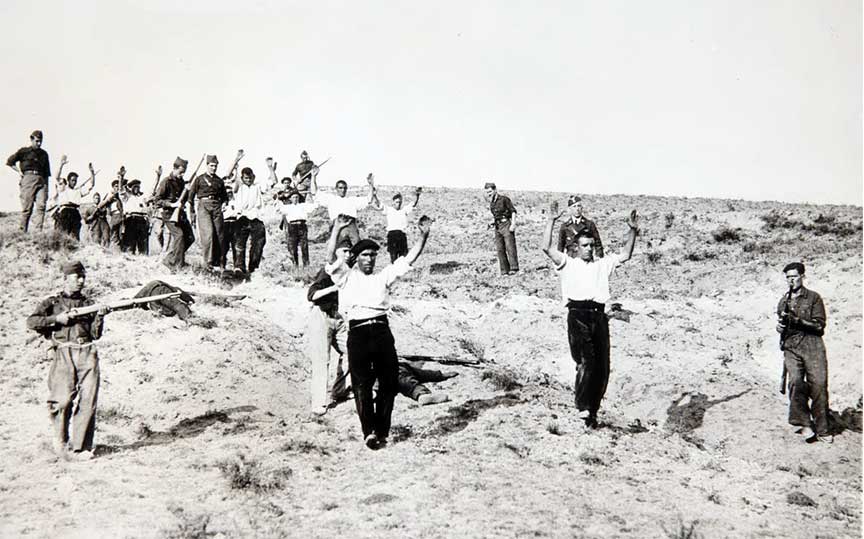
The Spanish Civil War came to an end in March 1939, with the surrender of Madrid and Valencia. The Republicans had fought a long and valiant defense, but the superior armaments and outright intervention of the Germans and Italians (particularly the air forces), overwhelmed the Republicans. Seven hundred thousand lost their lives in battle; 30,000 were executed or assassinated and 15,000 were killed in aerial bombings during the course of the war.
In early 1937 the Spanish Nationalists under Franco tried to cut the links between Madrid and Valencia. Still, the Republican forces were able to stop them and force the Italian troops that were fighting for the Nationalists to withdraw. Franco decided to change tactics and concentrate on capturing the rest of the Basque area. His forces made slow but steady progress. To help Franco's forces, German bombers would bomb towns that basque troops might be in. On March 31, 1937, they bombed Durango killing 258 people, mostly civilians.
The German next target was the Basque capital of Guernica. The city was full of refugees from the surrounding area. On April 26, German aircraft bombed the town on market day of three hours. When it was over, at least 1,645 people were dead. The bombing of Guernica marked a new milestone in the history of aviation. The first massacre to be carried out from the air. The bombing of Guernica received extensive attention in the worldwide media and became a rallying cry for anti-fascist worldwide. However, on the ground, the bombing achieved its goal, and the forces of Franco went on to conquer the entire Basque region by October. At the same time, however, government forces were making advances against the rebels in the country's center, reconquering areas that had earlier been lost; however, the cost of those advances was very high.
In early 1938 the Republicans succeeded in conquering Teruel from Franco's forces. However, Franco, thanks to heavy Italian and German air support, was able to reconquer it. On March 7, Franco's forces launched the Argon Offensive, and by April 14, they had reached the Mediterranean, effectively cutting the area controlled by the Republicans in half. The Republicans responded with an all-out campaign to recapture the territory in the Battle of the Ebro. The battle lasted from July 24 to November 26, 1938, the Republican efforts failed. Their morale was hurt by the Munich accords, which undermined the hope of the Republicans for a united front with Western powers. The failure of the offensive doomed the Republicans. At the beginning of 1939, Franco's troops attacked Catalonia; Tarragona fell on January 15, 1939, followed by Barcelona on January 26. On March 26, the Nationalists began their final offensive. They occupied Madrid on March 31, 1939. The Spanish Civil War was over; Franco had won.
 >
>